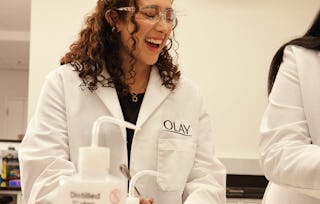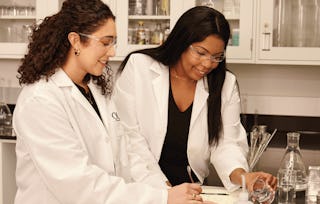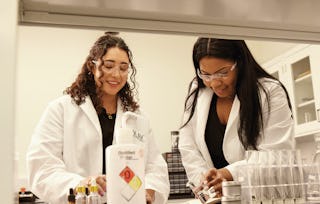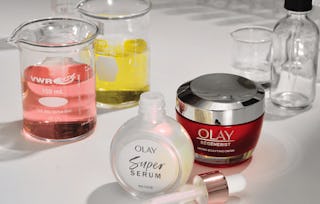This course is part of the Cosmetic Science Specialization. This course explores the science and practice of cosmetic formulation, guiding you from foundational raw material selection to advanced product optimization and performance evaluation. You will examine surfactants, emulsifiers, preservatives, rheology modifiers, and additives, while developing safe and effective laboratory practices, accurate documentation, and quantitative formulation skills. As the course progresses, you will apply formulation mathematics, interpret Certificates of Analysis, and compare skincare system designs to support stable, high-performing products. In the final module, you will integrate testing data, troubleshoot formulation challenges, and justify product design decisions using real-world scenarios. By the end of the course, you will be prepared to design, evaluate, and refine cosmetic formulations with scientific rigor and professional confidence.

Cosmetic Formulation Science

Cosmetic Formulation Science
This course is part of Introduction to Cosmetic Science and Ingredients Specialization

Instructor: Dr. Rolanda Wilkerson
13,707 already enrolled
Included with
127 reviews
Recommended experience
What you'll learn
Develop skills in selecting and using cosmetic raw materials
Understand the essentials of cosmetic formulation and laboratory safety
Learn effective documentation techniques for cosmetic science.
Acquire practical knowledge in writing and processing cosmetic formulas
Skills you'll gain
Details to know

Add to your LinkedIn profile
16 assignments
See how employees at top companies are mastering in-demand skills

Build your subject-matter expertise
- Learn new concepts from industry experts
- Gain a foundational understanding of a subject or tool
- Develop job-relevant skills with hands-on projects
- Earn a shareable career certificate

There are 4 modules in this course
Welcome to Cosmetic Formulation Science. This is the second course of the P&G Cosmetic Science Specialization program. In this course, you will explore the fundamentals of cosmetic formulations, emphasizing the selection and use of raw materials for your formulations. This week, you will learn about the importance of raw materials in cosmetic formulations. You'll learn to identify and select the ideal raw materials, ensuring your formulations are effective and innovative. This foundational knowledge is essential for anyone aspiring to excel in the cosmetic industry. Let's dive in!
What's included
6 videos5 readings2 assignments2 discussion prompts
This week, you will get into the details of the cosmetic formulation process, specifically focusing on surfactants and additives. You'll explore the diverse behaviors of different surfactants and additives and learn about the hydrophilic-lipophilic balance (HLB) scale for emulsifier selection. Additionally, you'll delve into the various categories of preservatives, enriching your understanding of the components that make up effective cosmetic products.
What's included
23 videos3 readings4 assignments
This week, you'll become well-versed in the importance of laboratory safety and the relevant codes that govern it. You'll identify and utilize cosmetic personal protective equipment (PPE) and become familiar with the best practices for working in a cosmetic laboratory. Furthermore, this module will help you develop insights into the importance of meticulous record-keeping, emphasizing the use of laboratory notebooks and digital records.
What's included
12 videos3 readings5 assignments
In this week, we explore the fundamental concepts of skincare formulation. You will learn about their differences and how to use them effectively in your product formulation. You will explore using weight percentages in formulations and learn how to convert mass percentages accurately. You will also learn about different types of skincare formulations and explore the concept of Certificate analysis and determining specifications.
What's included
8 videos4 readings5 assignments
Earn a career certificate
Add this credential to your LinkedIn profile, resume, or CV. Share it on social media and in your performance review.
Instructor

Offered by
Explore more from Basic Science
 Status: Free Trial
Status: Free Trial Status: Free Trial
Status: Free Trial Status: Free Trial
Status: Free Trial Status: Free Trial
Status: Free Trial
Why people choose Coursera for their career

Felipe M.

Jennifer J.

Larry W.

Chaitanya A.
Learner reviews
- 5 stars
81.10%
- 4 stars
14.96%
- 3 stars
1.57%
- 2 stars
0.78%
- 1 star
1.57%
Showing 3 of 127
Reviewed on Jun 15, 2024
Good course, but some questions are asked before you even get to that part of learning.
Reviewed on Apr 23, 2024
Great lectures with interesting topics and highly qualified team
Reviewed on Sep 24, 2024
This course has given me a more in-depth understanding of the cosmetic formulation process.

Open new doors with Coursera Plus
Unlimited access to 10,000+ world-class courses, hands-on projects, and job-ready certificate programs - all included in your subscription
Advance your career with an online degree
Earn a degree from world-class universities - 100% online
Join over 3,400 global companies that choose Coursera for Business
Upskill your employees to excel in the digital economy
Frequently asked questions
To access the course materials, assignments and to earn a Certificate, you will need to purchase the Certificate experience when you enroll in a course. You can try a Free Trial instead, or apply for Financial Aid. The course may offer 'Full Course, No Certificate' instead. This option lets you see all course materials, submit required assessments, and get a final grade. This also means that you will not be able to purchase a Certificate experience.
When you enroll in the course, you get access to all of the courses in the Specialization, and you earn a certificate when you complete the work. Your electronic Certificate will be added to your Accomplishments page - from there, you can print your Certificate or add it to your LinkedIn profile.
Yes. In select learning programs, you can apply for financial aid or a scholarship if you can’t afford the enrollment fee. If fin aid or scholarship is available for your learning program selection, you’ll find a link to apply on the description page.
More questions
Financial aid available,

